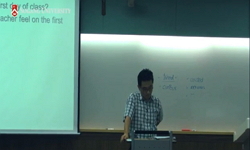배경 및 목적: 전체통일성 측정은 통일성의 유지 정도에 따라 각 발화에 점수를 주어 평균을 산정하는 방법, 전체통일성을 저해하는 발화를 오류로 보아 그 비율을 산정하는 방법, 담화의 전...
http://chineseinput.net/에서 pinyin(병음)방식으로 중국어를 변환할 수 있습니다.
변환된 중국어를 복사하여 사용하시면 됩니다.
- 中文 을 입력하시려면 zhongwen을 입력하시고 space를누르시면됩니다.
- 北京 을 입력하시려면 beijing을 입력하시고 space를 누르시면 됩니다.


기억상실형 경도인지장애 환자 담화의 전체통일성 분석 및 관련 인지기능 = Global Coherence Analysis of Discourse in Amnestic Mild Cognitive Impairment and Associated Cognitive Function
한글로보기https://www.riss.kr/link?id=A106016809
- 저자
- 발행기관
- 학술지명
- 권호사항
-
발행연도
2018
-
작성언어
-
- 주제어
-
KDC
370
-
등재정보
KCI등재,SCOPUS,ESCI
-
자료형태
학술저널
- 발행기관 URL
-
수록면
1028-1041(14쪽)
-
KCI 피인용횟수
1
- DOI식별코드
- 제공처
-
0
상세조회 -
0
다운로드
부가정보
국문 초록 (Abstract)
배경 및 목적: 전체통일성 측정은 통일성의 유지 정도에 따라 각 발화에 점수를 주어 평균을 산정하는 방법, 전체통일성을 저해하는 발화를 오류로 보아 그 비율을 산정하는 방법, 담화의 전체통일성 유지 정도에 따라 전체점수를 주는 방법이 있으며, 이 중 효율적인 측정 법에 대한 결론을 도출하기 어렵다. 따라서 본 연구 목적은 세 가지 전체통일성 측정법을 여러 담화과제에 일관적으로 적용하여 기억상 실형 경도인지장애(amnestic mild cognitive impairment, aMCI) 환자와 정상노년층의 발화를 비교하고, 세 가지 측정법 중 aMCI와 정상군 간 차이가 있는 측정법이 무엇인지를 모색하고, 전체통일성과 관련된 인지기능을 조사한다. 방법: 정상노년층 20명과 aMCI 환자 20명을 대상으로 공분산분석을 통해 전체통일성 수행 정도를 비교하였다. 또한, 로지스틱 회귀분석으로 민감도와 특이도를 이용한 절단값을 구하였다. 편상관분석을 통해 전체통일성에 관여하는 인지기능도 조사하였다. 결과: 세 가지 측정법 중 전체통일성 지수와 오류 비율이 환자군과 정상군 간 차이가 있었으며, 로지스틱 회귀분석으로 위 두 측정법의 변별정확도를 확인하였다. 환자군의 전체통일성은 즉각기억 및 의미유창성 점수와 관련이 있었다. 논의 및 결론: 담화상에서 부적절한 자기중심적 발화, 앞 내용의 반복이 많이 포함되 며, 30% 이상의 오류비율을 보일 경우 aMCI일 가능성이 높다. 또한, 절단값 이하의 수행은 의미-화용론적인 손상, 단기기억 및 집행기 능의 감퇴를 반영한다.
다국어 초록 (Multilingual Abstract)
Objectives: Global coherence measures include a mean score of utterances according to the degree of theme maintenance, a method of estimating the ratio of utterances that inhibit coherence, and a subjective rating score given whole discourse (i.e., a ...
Objectives: Global coherence measures include a mean score of utterances according to the degree of theme maintenance, a method of estimating the ratio of utterances that inhibit coherence, and a subjective rating score given whole discourse (i.e., a global coherence index, an error rate, a subjective rating score). The purposes of this study are as follows: to compare scores of three measures between patients with amnestic mild cognitive impairment (aMCI) and the normal elderly; to find out adequate global coherence measure among them; and to investigate cognitive functions which are associated with global coherence. Methods: Analysis of covariance was used for the group comparison between 20 patients with aMCI and 20 normal elderly. Measures were investigated through logistic regression analysis and receiver operating characteristic curve, and then cut-points were computed with sensitivity and specificity. Partial correlation analysis was used for finding out cognitive functions related with global coherence. Results: Significant group differences were found in a global coherence index and an error rate. The logistic regression analysis resulted in significantly lower global coherence index and significantly higher error rate of aMCI compared to the normal elderly. Cognitive functions which were associated with three measures were immediate recall and semantic verbal fluency. Conclusion: Discourses of aMCI are liable to be irrelevant, egocentric, and repetitive, or have more than 30% error utterances. Scores under the cut-points imply communicative and semanticpragmatic declines of language use, and reduced memory and executive functions. These linguistic and cognitive impairments are reflected in global coherence of aMCI.
참고문헌 (Reference)
1 김정완, "알츠하이머형 치매환자의 발화특성" 한국언어청각임상학회 11 (11): 82-98, 2006
2 김향희, "문항반응이론을 적용한한국판 보스톤 이름대기 검사 단축형(K-BNT-15) 개발" 한국콘텐츠학회 13 (13): 321-327, 2013
3 최현주, "기억형 경도인지장애 환자의 의미적 측면에서의 언어장애 특성" 대한치매학회 12 (12): 33-40, 2013
4 Miyake, A., "The unity and diversity of executive functions and their contributions to complex"Frontal Lobe"tasks : a latent variable analysis" 41 : 49-100, 2000
5 Mozeiko, J., "The relationship of story grammar and executive function following TBI" 25 : 826-835, 2011
6 Ash, S., "The organization of narrative discourse in Lewy body spectrum disorder" 119 : 30-41, 2011
7 Ash, S., "The organization of narrative discourse in Lewy body spectrum disorder" 119 : 30-41, 2011
8 Ash, S., "The organization and anatomy of narrative comprehension and expression in Lewy body spectrum disorders" 26 : 368-384, 2012
9 Brownell, H. H., "The neuropsychology of narrative comprehension" 2 : 247-250, 1988
10 Duong, A., "The heterogeneity of picture-supported narratives in Alzheimer’s disease" 93 : 173-184, 2005
1 김정완, "알츠하이머형 치매환자의 발화특성" 한국언어청각임상학회 11 (11): 82-98, 2006
2 김향희, "문항반응이론을 적용한한국판 보스톤 이름대기 검사 단축형(K-BNT-15) 개발" 한국콘텐츠학회 13 (13): 321-327, 2013
3 최현주, "기억형 경도인지장애 환자의 의미적 측면에서의 언어장애 특성" 대한치매학회 12 (12): 33-40, 2013
4 Miyake, A., "The unity and diversity of executive functions and their contributions to complex"Frontal Lobe"tasks : a latent variable analysis" 41 : 49-100, 2000
5 Mozeiko, J., "The relationship of story grammar and executive function following TBI" 25 : 826-835, 2011
6 Ash, S., "The organization of narrative discourse in Lewy body spectrum disorder" 119 : 30-41, 2011
7 Ash, S., "The organization of narrative discourse in Lewy body spectrum disorder" 119 : 30-41, 2011
8 Ash, S., "The organization and anatomy of narrative comprehension and expression in Lewy body spectrum disorders" 26 : 368-384, 2012
9 Brownell, H. H., "The neuropsychology of narrative comprehension" 2 : 247-250, 1988
10 Duong, A., "The heterogeneity of picture-supported narratives in Alzheimer’s disease" 93 : 173-184, 2005
11 Andreetta, S., "The effect of lexical deficits on narrative disturbances in fluent aphasia" 29 : 705-723, 2015
12 Shewan, C. M., "The Shewan spontaneous language analysis(SSLA)system for aphasic adults : description, reliability, and validity" 21 : 103-138, 1988
13 Kent, R. D., "The MIT encyclopedia of communication disorders" Cambridge University Press 2004
14 Fleming, V. B., "Test-retest discourse performance of individuals with mild cognitive impairment" 23 : 940-950, 2009
15 Race, E., "Sharing mental simulations and stories : hippocampal contributions to discourse integration" 63 : 271-281, 2015
16 Kang, Y. W., "Seoul Neuropsychological Screening Battery-II" Human Brain Research & Consulting 2012
17 Ahmed, S., "Semantic processing in connected speech at a uniformly early stage of autopsy-confirmed Alzheimer’s disease" 27 : 79-85, 2013
18 Kim, H., "Screening test for aphasia neurologic-communication disorder" Hakjisa 2009
19 Davis, G. A., "Referential cohesion and logical coherence of narration after right hemisphere stroke" 56 : 183-210, 1997
20 Davis, G. A., "Referential cohesion and logical coherence of narration after closed head injury" 89 : 508-523, 2004
21 Greiner, M., "Principles and practical application of the receiver-operating characteristic analysis for diagnostic tests" 45 : 23-41, 2000
22 Marini, A., "Please get to the point! A cortical correlate of linguistic informativeness" 24 : 2211-2222, 2012
23 Glosser, G., "Patterns of discourse production among neurological patients with fluent language disorders" 40 : 67-88, 1991
24 Schisterman, E. F., "Optimal cutpoint and its corresponding Youden index to discriminate individuals using pooled blood samples" 16 : 73-81, 2005
25 Troiani, V., "Narrative speech production : an fMRI study using continuous arterial spin labeling" 40 : 932-939, 2008
26 Marini, A., "Narrative language in traumatic brain injury" 49 : 2904-2910, 2011
27 Andreetta, S., "Narrative discourse in anomic aphasia" 50 : 1787-1793, 2012
28 Ash, S., "Narrative discourse deficits in amyotrophic lateral sclerosis" 83 : 520-528, 2014
29 Sherratt, S., "Multi‐level discourse analysis : a feasible approach" 21 : 375-393, 2007
30 Petersen, R. C., "Mild cognitive impairment as a diagnostic entity" 256 : 183-194, 2004
31 Coelho, C. A., "Longitudinal assessment of coherence in an adult with fluent aphasia : a follow-up study" 17 : 173-182, 2003
32 Perlini, C., "Linguistic production and syntactic comprehension in schizophrenia and bipolar disorder" 126 : 363-376, 2012
33 Taler, V., "Language performance in Alzheimer’s disease and mild cognitive impairment : a comparative review" 30 : 501-556, 2008
34 Youden, W. J., "Index for rating diagnostic tests" 3 : 32-35, 1950
35 Wright, H. H., "Global coherence in younger and older adults: influence of cognitive processes and discourse type" 21 : 174-196, 2014
36 Ellis, C., "Global coherence during discourse production in adults : a review of the literature" 51 : 359-367, 2016
37 Mayer, M., "Frog, where are you?" Dial Press 1969
38 Wright, H. H., "Evaluating measures of global coherence ability in stories in adults" 48 : 249-256, 2013
39 Fleming, V. B., "Early detection of cognitive-linguistic change associated with mild cognitive impairment" 35 : 146-157, 2014
40 Le, K., "Does brain volume loss predict cognitive and narrative discourse performance following traumatic brain injury?" 23 : S271-S284, 2014
41 Coelho, C. A., "Discourse production following injury to the dorsolateral prefrontal cortex" 50 : 3564-3572, 2012
42 Sherratt, S., "Discourse production after right brain damage : gaining a comprehensive picture using a multi-level processing model" 25 : 213-239, 2012
43 Kim, B. S., "Discourse measures to differentiate between mild cognitive impairment and the normal elderly" Yonsei University 2016
44 Carlomagno, S., "Discourse information content in non-aphasic adults with brain injury : a pilot study" 25 : 1010-1018, 2011
45 Lai, Y. H., "Discourse features of chinese-speaking seniors with and without Alzheimer’s disease" 15 : 411-434, 2014
46 Rogalski, Y., "Discourse coherence and cognition after stroke : a dual task study" 43 : 212-224, 2010
47 Chapman, S. B., "Discourse changes in early Alzheimer disease, mild cognitive impairment, and normal aging" 16 : 177-186, 2002
48 Bloom, R. L., "Discourse analysis and applications: studies in adult clinical populations" Erlbaum 1994
49 Joanette, Y., "Discourse ability and brain damage" Springer 1990
50 Kim, H., "Differentiating between aphasic and nonaphasic stroke patients using semantic verbal fluency measures with administration time of 30 seconds" 65 : 113-117, 2011
51 Drummond, C., "Deficits in narrative discourse elicited by visual stimuli are already present in patients with mild cognitive impairment" 7 : 96-, 2015
52 Kim, H., "Decision making in fluency measures of aphasic spontaneous speech" 3 : 5-19, 1998
53 Tomoeda, C. K., "Cross-sectional analysis of Alzheimer disease effects on oral discourse in a picture description task" 10 : 204-215, 1996
54 Wright, H. H., "Considering a multi-level approach to understanding maintenance of global coherence in adults with aphasia" 26 : 656-672, 2012
55 Mueller, K. D., "Connected speech and language in mild cognitive impairment and Alzheimer’s disease: a review of picture description tasks" 1-23, 2018
56 Mueller, K. D., "Connected language in late middle-aged adults at risk for Alzheimer’s disease" 54 : 1539-1550, 2016
57 Fleming, V. B., "Complex discourse production in mild cognitive impairment : detecting subtle changes" 22 : 729-740, 2008
58 Harris, J. L., "Communication wellness check-up : age-related changes in communicative abilities" 22 : 813-825, 2008
59 Reese, E., "Coherence of personal narratives across the lifespan : a multidimensional model and coding method" 12 : 424-462, 2011
60 Marini, A., "Cognitive correlates of narrative impairment in moderate traumatic brain injury" 64 : 282-288, 2014
61 Cheon, O. H., "Characteristics of the discourse of the elderly in conversation, picture description, and story telling" Yonsei University 2011
62 Ditman, T., "Building coherence : a framework for exploring the breakdown of links across clause boundaries in schizophrenia" 23 : 254-269, 2010
63 Whitworth, A., "Beyond narrative: is there an implicit structure to the way in which adults organise their discourse?" 29 : 455-481, 2015
64 Smith, R., "Analysis of normal discourse patterns" 53 : 368-371, 2003
65 Lee, Y. M., "An utterance analysis of conversations and picture description tasks of Korean adults" 6 : 1-11, 2001
66 Stein, N., "An analysis of story comprehension in elementary school children" Erlbaum 1979
67 Han, C., "An adaptation of the Korean mini-mental state examination(K-MMSE)in elderly Koreans : demographic influence and population-based norms(the AGE study)" 47 : 302-310, 2008
68 Kwon, M., "A study for analyzing spontaneous speech of Korean adults with CIU scoring system" 3 : 35-49, 1998
69 Marini, A., "A multi-level approach to the analysis of narrative language in aphasia" 25 : 1372-1392, 2011
동일학술지(권/호) 다른 논문
-
- 한국언어청각임상학회
- Khalid G. Al-Shdifat
- 2018
- KCI등재,SCOPUS,ESCI
-
Differences of Early Semantic Relatedness between Late Talkers and Typically Developing Children
- 한국언어청각임상학회
- 김유미
- 2018
- KCI등재,SCOPUS,ESCI
-
- 한국언어청각임상학회
- 하승희(Seunghee Ha)
- 2018
- KCI등재,SCOPUS,ESCI
-
한국인 화자에서 새로운 버전의 Acoustic Voice Quality Index 적용
- 한국언어청각임상학회
- 김근효(Geun-Hyo Kim)
- 2018
- KCI등재,SCOPUS,ESCI
분석정보
인용정보 인용지수 설명보기
학술지 이력
| 연월일 | 이력구분 | 이력상세 | 등재구분 |
|---|---|---|---|
| 2018 | 평가예정 | 계속평가 신청대상(등재유지) | |
| 2015-01-01 | 평가 | 등재학술지 유지(등재유지) |  |
| 2013-03-29 | 학술지명변경 | 한글명 : Communication Sciences and Disorders</br>외국어명 : Communication Sciences and Disorders |  |
| 2012-12-18 | 학술지명변경 | 한글명 : 언어청각장애연구</br>외국어명 : Communication Sciences and Disorders |  |
| 2011-01-01 | 평가 | 등재학술지 유지(등재유지) |  |
| 2009-01-01 | 평가 | 등재학술지 유지(등재유지) |  |
| 2007-06-25 | 학술지명변경 | 한글명 : 언어청각장애연구</br>외국어명 : Korean Journal of Communication Disorders |  |
| 2007-01-01 | 평가 | 등재학술지 유지(등재유지) |  |
| 2006-09-13 | 학술지명변경 | 한글명 : 언어청각장애연구</br>외국어명 : Korean Journal of Communication Disorders |  |
| 2005-10-14 | 학술지명변경 | 한글명 : 언어청각장애연구</br>외국어명 : Korean Journal of Communication Disorders |  |
| 2004-01-01 | 평가 | 등재학술지 선정(등재후보2차) |  |
| 2003-01-01 | 평가 | 등재후보 1차 PASS(등재후보1차) |  |
| 2001-07-01 | 평가 | 등재후보학술지 선정(신규평가) |  |
학술지 인용정보
| 기준연도 | WOS-KCI 통합IF(2년) | KCIF(2년) | KCIF(3년) |
|---|---|---|---|
| 2016 | 1.13 | 1.13 | 1.17 |
| KCIF(4년) | KCIF(5년) | 중심성지수(3년) | 즉시성지수 |
| 1.21 | 1.18 | 1.626 | 0.33 |




 스콜라
스콜라






